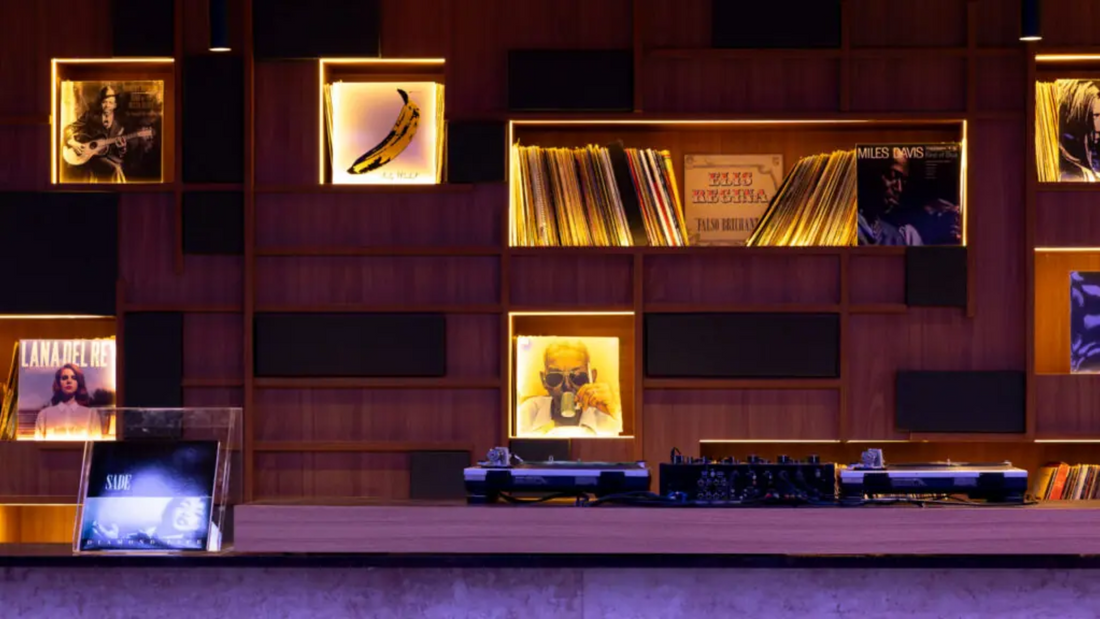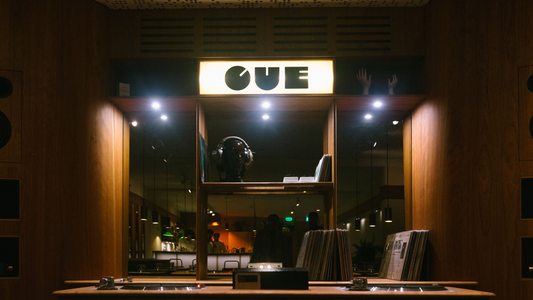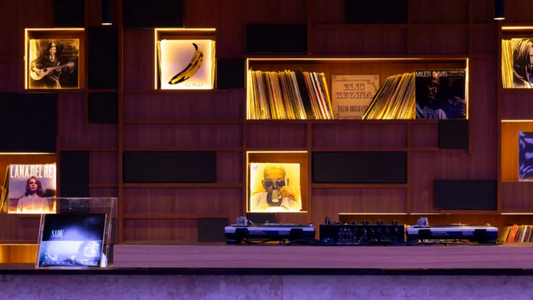
The First Five Minutes
By Rafi Mercer
Every great night begins with a threshold. Not a door exactly, more a hush—the pause before a needle finds its groove, the way a room draws a breath together and decides what kind of place it will be. I’ve learnt to treat the first five minutes as an instrument. Play it right and the evening blooms with ease. Rush it, and you spend hours repairing the spell you snapped in half.
Begin with the room. Not the records, not the whisky—those come after. Walk the perimeter with the lights low and the system warming. Listen to the quiet. There is always a fingerprint of noise: the hush of the fridge, a window’s light whistle, the soft thrum of the city outside. Don’t fight it; tune around it. Pull the curtains, soften the corners with fabric, nudge a plant where reflections flare. You are setting the canvas, not painting over it.
Now the level. The first record should arrive as a presence rather than a declaration. Start with the pot at a whisper, then bring it up like daylight. You’re adjusting not just decibels but trust. People lean in when you rise slowly; they back away when you arrive at volume with a stamp. If you like numbers, keep an SPL app handy and think in zones: 70 dB for welcome, 75–78 dB for flow, 80–83 dB for that brief lift when the room is ready. But never start at the ceiling. Leave headroom for surprise.
What to play? The first track is a compass, not a trophy. It points. It says: here’s how we’ll breathe tonight. I keep a small shelf of openers: tracks with space in them, tone-setters that hold the centre without demanding attention. Pharoah Sanders’ “Harvest Time” is a door that opens on a garden; The xx’s “Intro” brings shadow and structure; Mulatu Astatke’s “Yègellé Tezeta” sets a soft stride; Nils Frahm’s “Says” builds with patience until the floor seems to levitate. If you need voice, try Nina Simone’s “Mood Indigo” at a lower-than-expected level, as if the room discovered the record rather than you. None of these are commandments. They’re invitations.
The pour is part of the phrase. A small measure in heavy glass, one clear cube if the evening is long. The first clink should coincide with the first bars—not because it’s theatrical, but because rhythm belongs everywhere. You can make a ritual without making a fuss: a towel folded under the bottle so the collar doesn’t drip on the sleeve, a coaster under the glass to quiet the set-down, a slice of citrus close at hand if you’re lifting grain with brightness. Even a cup of green tea performs the same office: warmth, pace, a signal that we’re treating time with care.
Cueing matters. Lift the arm, exhale, land the stylus with respect. No flourish, no panic. If you’re playing from files, treat the play button with the same calm. Digital doesn’t excuse haste; it just exposes it. And if you’re working behind a bar—home or venue—resist the urge to talk over the first track. Introduce what needs to be introduced before the record starts. Then let the room and the music shake hands without you in the middle.
Sequencing the second piece is where you lock the arc. Don’t escalate. Stabilise. A wise follow-up holds the temperature. If you opened with ambience, ease into rhythm that honours the air you’ve made. If you began with rhythm, offer harmony or timbre that anchors the pulse. I think in threes: opener (orientation), settler (confidence), reveal (character). After that, the night can turn anywhere—soul to cosmic, dub to deep house, modal jazz to minimalism—because you’ve taught the room how to listen.
If you’re doing this at home for two or three friends, the same principles apply. Hide your phone. Put chairs where eyes can see the turntable without craning. Ask each guest to bring one record with a short story attached. Stories change how ears receive sound; they add a second melody—human timbre braided with recorded tone. Keep the first side for arrivals. Keep the needle clean. Keep time on your side by refusing to rush.
And if you’re alone, the first five minutes are even more potent. That is when the house changes state. You don’t need company to make a place. You need intention. Let the first record be a threshold you cross with yourself: glass in hand, shoulders lowered, volume rising like dawn. The rest of the night is only an echo of how you began.
The art isn’t complicated. It’s considerate. Five minutes that decide the next five hours. A door, a breath, a needle, a note. Start there, and everything else finds its place.
Rafi Mercer writes about the spaces where music matters. For more stories from Tracks & Tales, subscribe here, or click here to read more.






